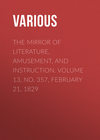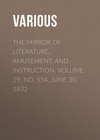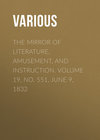Loe raamatut: «The Mirror of Literature, Amusement, and Instruction. Volume 13, No. 357, February 21, 1829», lehekülg 6
Well—I write at my friends, and then I tumble about when I wake, and dream in the sleep what should possible be the description of the box what I must be put in to-morrow for my voyage.
In the morning, it was very fine time, I see the coach at the door, and I walk all round before they bring the horses; but I see nothing what they can call boxes, only the same kind as what my little business was put into. So I ask for the post of letters at a little boots boy, who showed me by the Quay, and tell me, pointing by his finger at a window—"There see, there was the letter box," and I perceive a crevice. "Very well—all box again to-day," I say, and give my letter to the master of postes, and go away again at the coach, where I very soon find out what was coach-box, and mount myself upon it. Then come the coachman, habilitated like the gentleman, and the first word he say was—"Keephorses! Bring my box-coat!" and he push up a grand capote with many scrapes.
"But—never mind," I say; "I shall see all the boxes in time." So he kick his leg upon the board, and cry "cheat!" and we are out into the country in lesser than one minute, and roll at so grand pace, what I have had fear we will be reversed. But after little times, I take courage, and we begin to entertain together: but I hear one of the wheels cry squeak, so I tell him, "Sir—one of the wheel would be greased;" then he make reply, nonchalancely, "Oh—it is nothing but one of the boxes what is too tight." But it is very long time after as I learn that wheel a box was pipe of iron what go turn round upon the axle.
Well—we fly away at the paces of charge. I see great castles, many; then come a pretty house of country well ornamented, and I make inquire what it should be. "Oh;" responsed he, "I not remember the gentleman's name, but it is what we call a snug country box."
Then I feel myself abymed at despair, and begin to suspect that he amused himself. But, still I tell myself, "Well—never mind; we shall see." And then after sometimes, there come another house, all alone in a forest, not ornated at all. "What, how you call that?" I demand of him.—"Oh!" he responded again, "That is a shooting box of Lord Killfots."—"Oh!" I cry at last out, "that is little too strong;" but he hoisted his shoulders and say nothing. Well, we come at a house of country, ancient, with the trees cut like some peacocks, and I demand, "What you call these trees?"—"Box, sir," he tell me. "Devil is in the box," I say at myself. "But—never mind; we shall see." So I myself refreshed with a pinch of snuff and offer him, and he take very polite, and remark upon an instant, "That is a very handsome box of yours, sir."
"Morbleu!" I exclaimed with inadvertencyness, but I stop myself. Then he pull out his snuff-box, and I take a pinch, because I like at home to be sociable when I am out at voyages, and not show some pride with inferior. It was of wood beautiful with turnings, and colour of yellowish. So I was pleased to admire very much, and inquire the name of the wood, and again he say, "Box, Sir!" Well—I hold myself with patience, but it was difficilly; and we keep with great gallop till we come at a great crowd of the people. Then I say, "What for all so large concourse?" "Oh!" he response again, "there is one grand boxing match—a battle here to-day."—"Peste!" I tell myself, "a battle of boxes! Well, never mind! I hope it can be a combat at the outrance, and they all shall destroy one another, for I am fatigued."
Well—we arrive at an hotel, very superb, all as it ought, and I demand a morsel to refresh myself. I go into a salon, but before I finish, great noise come into the passage, and I pull the bell's rope to demand why so great tapage? The waiter tell me, and he laugh at same time, but very civil no less, "Oh, sir, it is only two of the women what quarrel, and one has given another a box on the ear."
Well—I go back on the coach-box, but I look, as I pass, at all the women ear, for the box; but not none I see. "Well," I tell myself once more, "never mind, we shall see;" and we drive on very passable and agreeable times till we approached ourselves near London; but then come one another coach of the opposition to pass by, and the coachman say, "No, my boy, it shan't do!" and then he whip his horses, and made some traverse upon the road, and tell to me, all the times, a long explication what the other coachman have done otherwhiles, and finish not till we stop, and the coach of opposition come behind him in one narrow place. Well—then he twist himself round, and, with full voice, cry himself out at the another man, who was so angry as himself, "I'll tell you what, my hearty! If you comes some more of your gammon at me, I shan't stand, and you shall yourself find in the wrong box." It was not for many weeks after as I find out the wrong box meaning.
Well—we get at London, at the coaches office, and I unlightened from my seat, and go at the bureau for pay my passage, and gentleman very politely demanded if I had some friend at London. I converse with him very little time in voyaging, because he was in the interior; but I perceive he is real gentleman. So, I say, "No, sir, I am stranger." Then he very honestly recommend me at an hotel, very proper, and tell me, "Sir, because I have some affairs at the Banque, I must sleep in the city this night; but to-morrow I shall come at the hotel, where you shall find some good attentions if you make the use of my name." "Very well," I tell myself, "this is best." So we exchange the cards, and I have hackney coach to come at my hotel, where they say, "No room, sir,—very sorry,—no room." But I demand to stop the moment, and produce the card what I could not read before, in the movements of the coach with the darkness. The master of the hotel take it from my hand, and become very polite at the instant, and whisper at the ear of some waiters, and these come at me, and say, "Oh yes, sir. I know Mr. Box very well. Worthy gentleman, Mr. Box.—Very proud to incommode any friend of Mr. Box—pray inlight yourself, and walk in my house." So I go in, and find myself very proper, and soon come so as if I was in my own particular chamber; and Mr. Box come next day, and I find very soon that he was the right Box, and not the wrong box.—Ha, ha!—You shall excuse my badinage,—eh? But never mind—I am going at Leicestershire to see the foxes hunting, and perhaps will get upon a coach-box in the spring, and go at Edinburgh; but I have fear I cannot come at your "Noctes," because I have not learn yet to eat so great supper. I always read what they speak there twice over, except what Mons. Le "Shepherd" say, what I read three time; but never could comprehend exactly what he say, though I discern some time the grand idea, what walk in darkness almost "visible," as your divine Milton say. I am particular fond of the poetry. I read three books of the "Paradise Lost" to Mr. Box, but he not hear me no more—he pronounce me perfect.
After one such compliment, it would be almost the same as ask you for another, if I shall make apology in case I have not find the correct ideotism of your language in this letter; so I shall not make none at all,—only throw myself at your mercy, like a great critic. But never mind,—we shall see. If you take this letter as it ought, I shall not promise if I would not write you one other some time.
I conclude by presenting at you my compliments very respectful. I am sorry for your gout and crutchedness, and hope you shall miss them in the spring.
I have the honour of subscribe myself,
Sir,
Your very humble and
Much obedient servant,
LOUIS LE CHEMINANT.
P.S.—Ha, ha!—It is very droll!—I tell my valet, we go at Leicestershire for the hunting fox.—Very well.—So soon as I finish this letter, he come and demand what I shall leave behind in orders for some presents, to give what people will come at my lodgments for Christmas Boxes.
Retrospective Gleanings
ANTIQUITY OF THE ALDERMAN
Alderman is derived from the Saxon word ealderman, that is a senior or alderman, which by degrees came to stand for persons of great distinction, because such were chosen to discharge the highest offices, being those whose long experience rendered them most capable, and whose birth and fortunes made them most conspicuous; and as they were generally entrusted with the government of the counties, instead of saying the governor, it was said the ealderman of such a county. While the heptarchy lasted, these offices were only during the king's pleasure; at last they became during life. After the Danes were settled in England, the title of ealderman was changed into that of earl, and the Normans introduced that of count, which, though different in its original signification, meant, however, the same dignity. There were several sorts of ealdermen; some were properly only governors of a province or county, others were owners of their province, holding it as a fee of the crown. These ealdermen, or earls, were honoured with titles of reguli subreguli, principes, patricii, and some times rex. Those who were only governors, had the title of ealderman of such a county, or sometimes in Latin by the term consul. The first administered justice in their own name, and appropriated to their own use all the revenues and profits of their respective counties. The last administered justice in the king's name and had only part of the profits assigned them. A third sort of ealdermen were those, who upon account of their high birth, bore the title, without any authority, out of which rank the governors were generally chosen. There were also inferior ealdermen in cities or boroughs, who administered justice in the king's name, and were dependent on the great ealdermen, or earls, which by the name of alderman still continues among us to those inferior officers, while they are called earls only. The office of the ealderman was wholly civil, and had nothing to do with either military or ecclesiastical affairs. What power each of them had, it is not easy to determine; but they were all obliged to have some knowledge of the law. In the Saxon times, the bishop and ealderman sat together to try causes; the one proceeded by the canons, the other by the common law. Part of the ealderman's jurisdiction was to examine the arms, and to raise the militia within such a district, in order to suppress riot and execute the sentence of a court of justice. He had likewise the cognizance of house-breaking, robbing, &c. Nor was it lawful for any person to move from one place to another without a certificate from the ealderman.
HALBERT H.




















